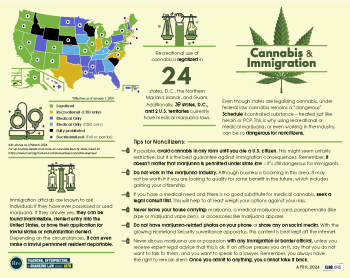
Despite new state laws legalizing cannabis for recreational use, archaic U.S. drug laws still classify marijuana as federally illegal. Because immigration is governed by federal law, this means that noncitizens may face serious problems down the line if they are not aware of how their experiences with cannabis could impact their immigration journey. This video and accompanying infographic detail the specific risks associated with the use or possession of cannabis and/or industry employment.

This resource briefly reviews the February 18, 2021 interim ICE Memo issued by Acting Director Tae Johnson regarding how ICE will carry out DHS enforcement priorities. The new ICE guidance, effective immediately, will remain in effect until DHS Secretary Alejandro Mayorkas issues new DHS enforcement guidelines. This resource covers applicable enforcement actions, a review of the described enforcement priorities, and potential advocacy opportunities.

What are sheriffs, what powers do they have, and how are they involved in immigration enforcement? This short fact sheet helps explain the role and power of sheriffs and their engagement with ICE.
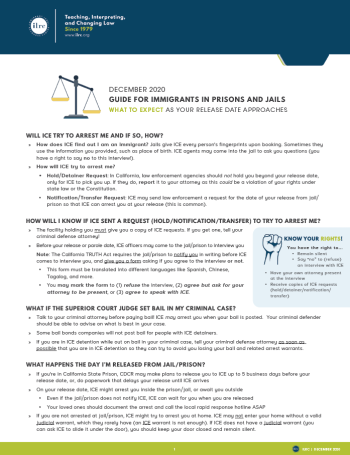
This one-pager goes over basic Know Your Rights information for immigrants incarcerated in California prisons. It includes suggested contact information for families and community members in need of immigration screening.
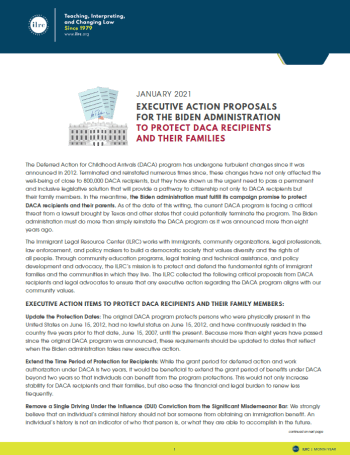
DACA has undergone turbulent changes since it was announced in 2012. Terminated and reinstated numerous times since, these changes have shown the urgent need to pass a permanent and inclusive legislative solution that will provide a pathway to citizenship not only to DACA recipients but their family members. In the meantime, the Biden administration must fulfill its campaign promise to protect DACA recipients and their parents. The ILRC collected 12 critical proposals from DACA recipients and legal advocates to ensure that any executive action regarding the DACA program aligns with our community values.
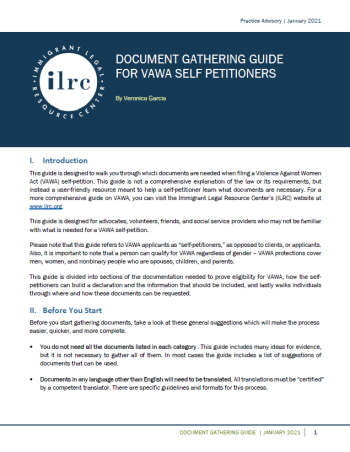
This resource is designed to help guide individuals gather the documents needed to file a Violence Against Women Act (VAWA) self-petition. The guide provides information for individuals as they begin to gather needed documentation and evidence for their filings. Note that the guide is not a comprehensive explanation of the law or its requirements, but instead a user-friendly resource meant to help a self-petitioner learn what documents are necessary. The resource is divided into three sections of the documentation needed to prove eligibility for VAWA, how the self-petitioners can build a declaration and the information that should be included, and lastly walks individuals through where and how these documents can be requested.

As new applicants begin to set their sights on initial DACA requests, there are several questions worth asking and steps worth taking to prepare productively. This guide is designed to walk community members through eligibility and process for submitting an initial application for deferred action and employment authorization. For information on submitting a renewal DACA application, please visit our full application deep dive video here.
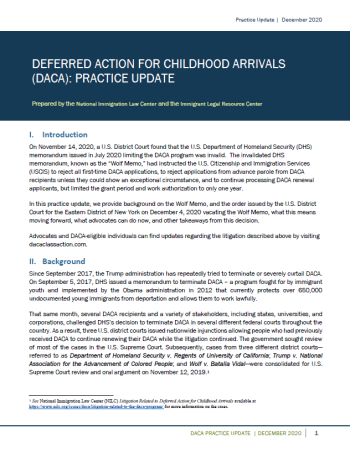
On November 14, 2020, a U.S. District Court found that the U.S. Department of Homeland Security (DHS) memorandum issued in July 2020 limiting the DACA program was invalid. This decision restored the DACA program to its original 2012 form and opened up the possibility for first-time applicants, restored two-year renewals, and allowed for DACA recipients to submit advance parole applications.
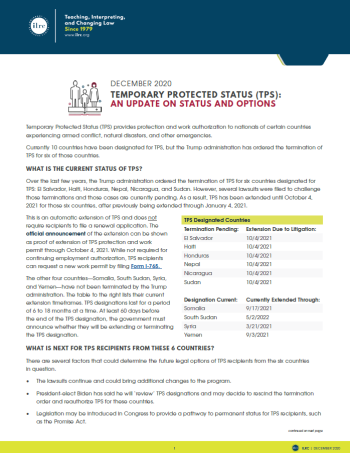
TPS recipients from six countries face potential termination of that protection from the Trump Administration, potentially impacting approximately 300,000 people. This resource provides an update on the current status of TPS for these countries and what rights and options beneficiaries have. It also outlines what they might expect as a result of legal challenges to the termination and under a new administration.
